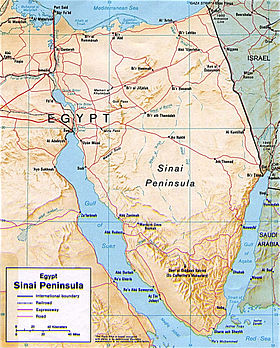Eritrean hostage under threat of death
A twenty-two year old refugee is being held hostage and facing death through 'organ harvesting' by Bedouin human traffickers in the Sinai who are demanding a $25,000 ransom for his release.
The Sinai Peninsula
 Christian Solidarity Worldwide (CSW) has learned that an Eritrean refugee held hostage by Bedouin traffickers for three months has been given five days to raise US$25,000 or face illegal organ harvesting. His case highlights a continuing lack of protection and assistance for refugees and migrants from the Horn of Africa, who are routinely abducted and abused by people traffickers in the Sinai Peninsular. Christian Solidarity Worldwide (CSW) has learned that an Eritrean refugee held hostage by Bedouin traffickers for three months has been given five days to raise US$25,000 or face illegal organ harvesting. His case highlights a continuing lack of protection and assistance for refugees and migrants from the Horn of Africa, who are routinely abducted and abused by people traffickers in the Sinai Peninsular.
Twenty-two year old Philemon Semere escaped from Eritrea to Ethiopia in 2010, where he sang in the church choir in Adi Harish Refugee Camp. Early in 2012, he travelled to Sudan and was attempting to reach Israel when he was abducted by Rashaida traffickers and taken to one of several torture and extortion facilities in the Sinai. He was beaten and abused regularly and at that time his captors asked him to source US$ 33,000 to ensure his release, or lose a kidney.
Early in 2012, he traveled to Sudan attempting to reach Israel, but was abducted by Rashaida traffickers and taken to what CSW called “one of several torture and extortion facilities in the Sinai.”
In October, Mr Semere was moved to another facility where he was subjected to electric shock torture, amongst other things. This morning his captors informed him he had five days to either produce US$ 25,000 or lose a kidney.
This morning the BBC broadcast a harrowing interview with the hostage and two of his captors speaking on the phone. In a telephone conversation with CSW’s Special Ambassador, Rev Stuart Windsor, a clearly distraught Mr. Semere confirmed that “if they don’t get the money, they will kill me in five days”.
The abduction, torture and extortion of refugees in purpose-built facilities in the Sinai has been extensively documented since 2010. Hostages are generally bound for extended periods; deprived of adequate food; given salty water to drink, and tortured using extreme methods, including electric shocks and branding, while friends and relatives are obliged to listen via telephone to their screams and pleas for assistance.
Women are particularly vulnerable to abuse, including gang-rape. Some hostages have been used as slave labour. Initially, demands for payment ranged between US$3000 and US$8000, but have increased enormously. When payments are not forthcoming, vital organs are illegally harvested in unhygienic conditions, generally resulting in the death of the person concerned.
CSW’s Special Ambassador Stuart Windsor said, “Our heartfelt prayers are with Philemon Semere as he faces this horrific ultimatum. The abduction and torture of human beings for profit and the illegal traffic in their organs is one of the most abhorrent forms of modern slavery and an appalling affront to human dignity. The continuation of this phenomenon is a terrible indictment of the failure of several signatories to international and regional refugee conventions to provide adequate protection for this vulnerable community.
CSW and other organisations are urging the Egyptian authorities to act decisively to rescue Semere and others in his position, and to combat trafficking by ensuring perpetrators are brought to justice. In recognising that trafficking is an international crime that spans national borders, and the organisation is calling for concerted international action to bring these appalling operations to an end.”
Footnote:
The Sinai Peninsula or Sinai is a triangular peninsula in Egypt about 23,000 sq mi in area. It is situated between the Mediterranean Sea to the north, and the Red Sea to the south, and is the only part of Egyptian territory located in Asia as opposed to Africa, effectively serving as a land bridge between two continents. It has a population of approximately 500,000 people.
The region has historically been the centre of conflict between various states, based largely on its strategic geopolitical location. As a 'buffer zone' between Egypt and Israel control of the region has fluctuated. In 1982, after the Israel-Egypt Peace Treaty of 1979, Israel withdrew from the entirety of Sinai and as part of the peace agreement it has, until very recently been demilitarised. However the Egypt/Gaza border has constantly been the focus of terrorist and smuggling activities.
|